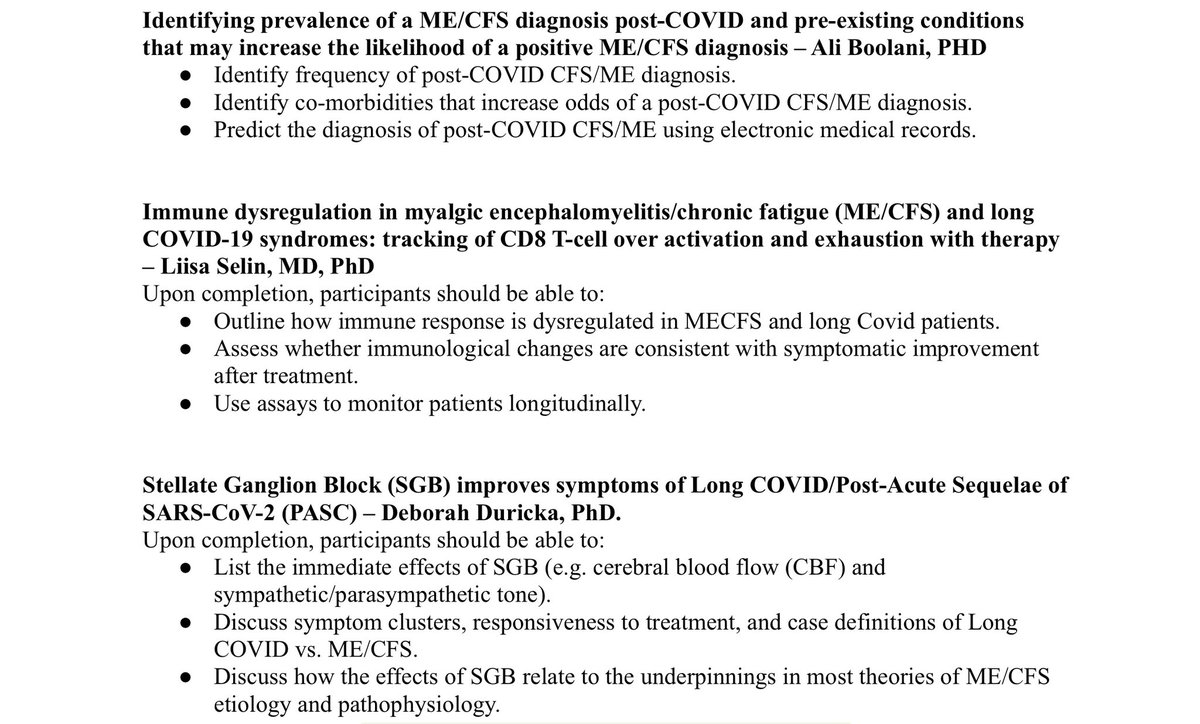Prof. Akiko Iwasaki @VirusesImmunity of @Yale @YaleMed is the keynote speaker of #IACFSME conference, presenting today on the immunology of Long COVID. #viruses #immunology #CovidIsNotOver #mecfs #LongCovid #COVID19 @itsbodypolitic
Dr. Iwasaki explains that SARS-Cov2 is “one of many unexplained post-acute infection syndromes [that]
occur after encounter with many distinct pathogens” (such as EBV, polio, & dengue). @NIH #LongCovid #LongCovidKids
occur after encounter with many distinct pathogens” (such as EBV, polio, & dengue). @NIH #LongCovid #LongCovidKids
Dr. Iwasaki says that COVID-19 can cause long-lasting symptoms involving almost all organs and cites @patientled research on symptomology of #LongCovid. @NIH #CovidIsNotOver
Hypotheses on pathogenesis of #LongCovid include 1) viral reservoir 2) autoimmunity 3)dysbiosis/reactivation 4) tissue damage @NIH
Reactive microglia are 1) abundant in the white matter in mild Covid mouse-model & 2) increased in autopsies of patients who were SARS-COV-2 positive at time of death.
This suggests that even respiratory-only SARS-CoV-2 infection leads to prolonged changes in the CNS. #COVID19 #LongCovid #CovidIsNotOver
“At 7 days and 7 weeks post infection, Covid19 infected mice have: Increased reactive microglia in the white matter,
Reduced neurogenesis in the hippocampus,
Reduced oligodendrocytes in the white matter,
Reduced myelination of axons”. #LongCovid #COVID19
Reduced neurogenesis in the hippocampus,
Reduced oligodendrocytes in the white matter,
Reduced myelination of axons”. #LongCovid #COVID19
In another, unpublished study, Dr. Iwasaki worked with @PutrinoLab. The study showed that #LongCovid patients “display significant perturbations in
myeloid and B cell compartments” and “have reduced CD4 T central memory and increased exhausted T cells”.
myeloid and B cell compartments” and “have reduced CD4 T central memory and increased exhausted T cells”.
“A chronic level of antigen may be driving the high level of antibodies in longhaulers”. #LongCovid @NIH
The study showed that “Long COVID is associated with significant differences in circulating cytokines and hormones” and “ high chemokines and lectins are
associated with increased disease severity”. #LongCovid
associated with increased disease severity”. #LongCovid
Other findings: #LongCovid “patients have altered humoral responses to herpesviruses” and they “show specific elevations in anti-EBV IgG targeting gp42”. More research is needed. @NIH #CovidIsNotOver
“Specific immunological perturbations define Long COVID”, such as exhausted T-cells. Also, “decreased cortisol alone efficiently classifies Long COVID”.
Prof. Iwasaki explains that ”Patient Reported Outcomes alone are sufficient to identify long COVID patients with 94% accuracy”. #COVID19 #LongCovid
Machine learning demonstrated that “Long COVID can be efficiently predicted from immunological data
alone”. #Covid_19 #LongCovid @NIH
alone”. #Covid_19 #LongCovid @NIH
Dr. Iwasaki :“randomized clinical trials of cortisol replacement therapy are needed”. “Targeting cytokines or potential viral reservoirs as well as monoclonal antibodies” are interesting areas of study. @NIH #LongCovid
Dr. Iwasaki : “we need randomized clinical trials in #LongCovid patients right now.” @NIH @itsbodypolitic #CovidIsNotOver #Covid_19
@NIH @itsbodypolitic Dr. Iwasaki said she does not currently have funding for #MECFS study. Hopefully, @NIH will remedy this. #LongCovid
• • •
Missing some Tweet in this thread? You can try to
force a refresh










